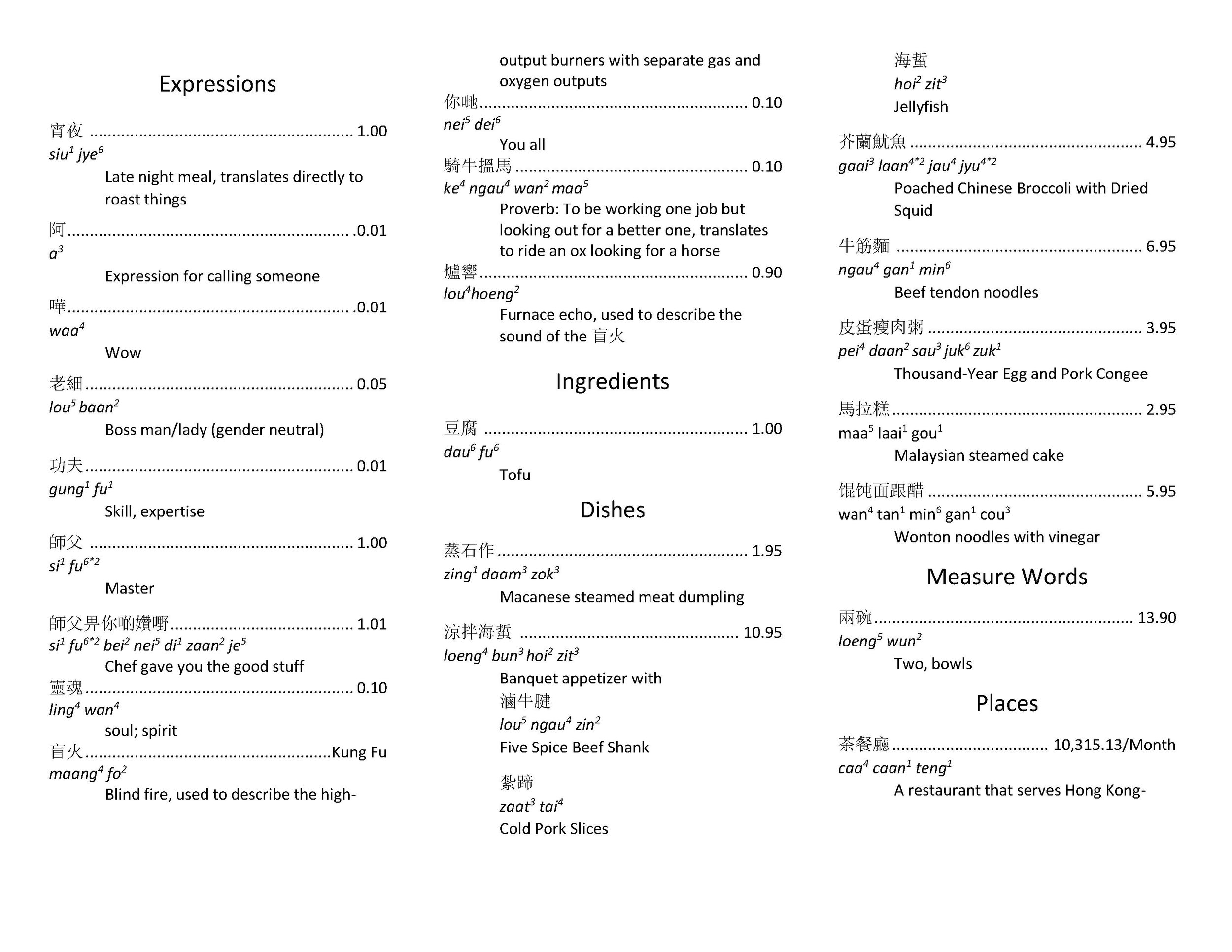One Hour Recording of the Northern Manor Kitchen
Photos and Text by Jasper Lo
The eighth poem in the collection To Go To Macau. See the first one here.
Hint: Indentation to match the finite record of the cassette tape, rounds expended from the magazine drum.
To Go To Macau is a collection of poetry. You can categorize it in both genres of cookbook and memoir, your typical Good Morning America grandmother combo. This collection attempts to answer opposing questions two SIPA students have asked me: by a Chinese student during orientation, "But you're not really Chinese right?" and by an American student at a SIPA happy hour, "You were born here? Are you American?" Within these two questions, I explore themes of diaspora, violence, masculinity, race, and migration.
The menu (translator):
One Hour Recording of the Northern Manor Kitchen
One hour begins.
Wooden pallets on the floor,
stock pots and steel wool
the perpetual clang of dishes.
Copper pipes drip water
a spoon in sugar, a sword in its stone
the vacuum sound of fire.
Steam escapes the reed brush
that smooths the wok
stiffer than the sponge
softer than the steel.
The finger and slight wrist flick of emphasis.
黃啟心’s son?
Nooo, 老表. 阿…
What is the conversation of men in the kitchen?
Well, 啟心is the one who looks for people –wrist flick.
Wipe down the bottles.
Cut a tray of pork loin.
Smoke break.
Keep it clean, keep it clean.
Prep, prep, prep.
Pips and pops
chopsticks dropped
metal on plates
a chimey‐chime of chefs!
The perspiring pipe drips,
water is always pouring.
Quiet comes in waves.
The two‐stroke match strike and wrist flick lights the stove.
Poses held when staring at a pot.
The hardened looks of Chinese men,
their eyebrows, furrowed and otherwise;
as if we age, always looking like life was cold and hard
men should moisturize more.
Everyone eats as they work,
pausing for 30 second bites
two spoonsful of rice
a gobble of noodles.
Dirty pots combine, possess a curious color of pink.
The paths of each cook
step to form bold lines
with tangential routes
faded in white.
The smell of fresh dough.
Walnuts become mulchy when boiled.
Have you ever seen three raw chickens sitting in a single bowl?
Watch as he cleans them,
rubbing each in his wok.
Every lever can be turned with the right flick of a hoak.
Suddenly the kitchen breathes.
Fire pushes through all the woks
And the colorful tunics of waiters appear;
must be lunch, rushing into chairs.
Fried fish appears,
ammunition from the fry station,
heave, hot pot coming through
one quick toss in sauce
clothespin on the dish
wok air escapes as ingredients transform into the order.
Plated and posted, the waiters remove the Clothespin and clip it to the line
a Chinese kitchen waltz of wok to table.
Then we return to leaning,
keep our woks simmering
our neighbor station breathes fire again
time for another.
A curious ménage of spices appears
with a large opened ginger.
What are you looking for? Oh, right there.
We breathe fire.
Cook oil until it shrivels,
ignite it
and pour onto four oysters
that shrink and fry
And water on the wok
explosion and toss.
Time to don the garbage bag,
beware of oil on white garb.
And leaning again, with a garbage bag tunic,
sipping from a jar, staring around.
A black bag cape, viewed from behind
tap tap, flick
three greens into a bowl.
Clothespin #32
Fire breath, fire breath
wok lift,
knee down,
now the fires off.
Knee up, it breathes again
fires in its clay lined stove.
Warm water boils in an instant.
Raw beef browns on touch
to the deep black wok.
It's smoking. Quick and delicate precision
in conjunction with the knee.
Is there such thing as a poetry firefight?
A residual flame dies against the clay.
Another dish plated
Wok air again.
Always a fire
Always a fire
Nothing but wrist toss and cloth
that separates a fire.
Oil pops on contact
water evaporates on touch.
One hours up.


